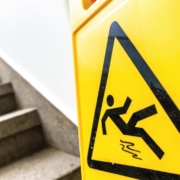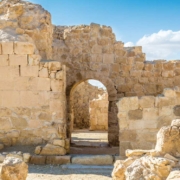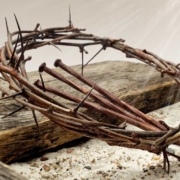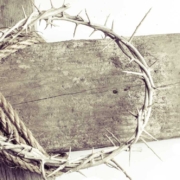The “New Testament” claims that Yeshua is the Son of God—an inconceivable and offensive claim in the eyes of Judaism. How could the holy, eternal Creator of the universe have a human son? Did He defile Himself to procreate with humans? Did He father biological offspring as in Greek myths and pagan religions? Yet despite such cynical ad hominems and red herrings—and regardless of whether one is prepared to believe that Yeshua is indeed that very Son—the concept of God having a son is actually not so unbelievable. It is, in fact, deeply rooted in the history of Israel and in the Hebrew Scriptures. Read more
“Adonai your God will raise up to you a prophet like me from among you, from your brothers. You must listen to him….” (Deuteronomy 18:15, mjlt)
Reaching the end of his days, Moses stood before Israel, giving them his final instructions before he could lead them no more. Prophet that he was, Moses pointed to the future, urging his people to await the coming of one who would take his place. Read more
As a Messianic Jewish ministry, our hearts’ desire and prayer to God is to see the salvation of all Israel. We yearn for that glorious day when God’s chosen people embrace their Messiah. Yet despite any strides which have been made toward this goal, most Jews remain cut off in their unbelief (Rom. 11:20), and the day of Israel’s salvation is nowhere in sight. What are we missing?
“And having been made perfect, He became a cause of age-enduring salvation to all those obeying Him, having been addressed by God as a Kohen Gadol according to the order of Mal’kiy-Tzedeq.” (He. 5:9-10, mjlt)
The book of Hebrews speaks of a mystery central to our faith: How did the great High Priest, Yeshua, arise from outside the priestly tribe of Levi, and why? Though the question may seem obscure to us now, thousands of years after the line of priests was broken, the answer is still as important as ever. Grasping it not only illuminates the magnificence of the Master’s sacrifice, but also illustrates how the Father continually maintains His covenants—sometimes in unexpected ways.
“Indeed, if you were believing Mosheh, you would have been believing me, for he wrote about me. But if you do not believe his writings, how will you believe my sayings?”
John 5:46-47, mjlt
The Jews sought to kill their own Messiah. Though the crowd was motivated by Yeshua’s supposed violation of the Shabbat, their rage was not truly founded on a love of God or His words. On the contrary, it was fueled by their disbelief of what God had spoken in the very Scriptures they appeared to defend—the Torah. Moses wrote about Yeshua many times, prophesying with symbolism, allusions, and even with plain speech. By looking at just a few examples, we can see how Moses illuminates some of the most important aspects of Yeshua’s life and work as our Messiah.
Hundreds of times in the New Covenant Scriptures, Yeshua is called “the Messiah.” Yet all too often, we fail to recognize the magnitude of this defining title. We know who the Messiah is, but do we truly comprehend what it means for Him to be the Messiah? Obviously, this title is significant, but in what way? Throughout the Hebrew Scriptures, we find other people who are also called “messiahs,” and examining their distinctions can help clarify the meaning and importance of Yeshua’s Messianic role.
Read moreWhat Is the Good News of Yeshua? (Part 24)
The people stood in astonishment and fear, having witnessed the terrifying spectacle. Still suspended above them was the lifeless body of their executed King, and before them, the aftermath of His violent and dramatic end. Some who had been watching were immediately filled with remorse and regret—their eyes opened to the atrocity that had just been perpetrated. Even as the people realized their grave mistake, saying, “Truly, this was God’s Son” (Matthew 27:54), a soldier pierced Yeshua’s side, and blood and water spilled out from His body upon the ground (John 19:34). The people returned home beating their chests in grief (Luke 23:48). The Son of God was dead.
The Bible says that Yeshua is coming back quickly (Rev. 4:11)—but apparently not as we count quickness. The Bible also says that there will be signs forecasting His return—yet it will still be unexpected (Mat. 24:44). So the question is: does this soon, unexpected return mean that His coming is imminent? At this time right now in world history, could Yeshua’s return happen at any moment? Read more
What Is the Good News of Yeshua? (Part 23)
Determined to have Yeshua put to death, the Jewish council dragged Him before the Roman governor of Judea. In an attempt to draw Rome into their plot, they listed their accusations and false charges, imploring the governor to carry out their desired sentence (Luke 23:2, John 18:31). Initially dismissive, the governor eventually questioned Yeshua concerning the allegation of His claim to be king of the Jews. Yet despite His profession that He was indeed “born, and… come to the world [to be king, so that He] may testify to the truth” (John 18:37), the governor found no fault with Him, and decided to let Him go. But the council was insistent, pushing back on the decision and keeping the proceedings alive.
What Is the Good News of Yeshua? (Part 22)
When the day for the annual Passover feast had arrived, Yeshua knew that His time was near (Matthew 26:18). Desiring to share His final Passover with His closest disciples, He sent them on ahead to prepare the foretelling meal.
a Perfect Word Ministry













